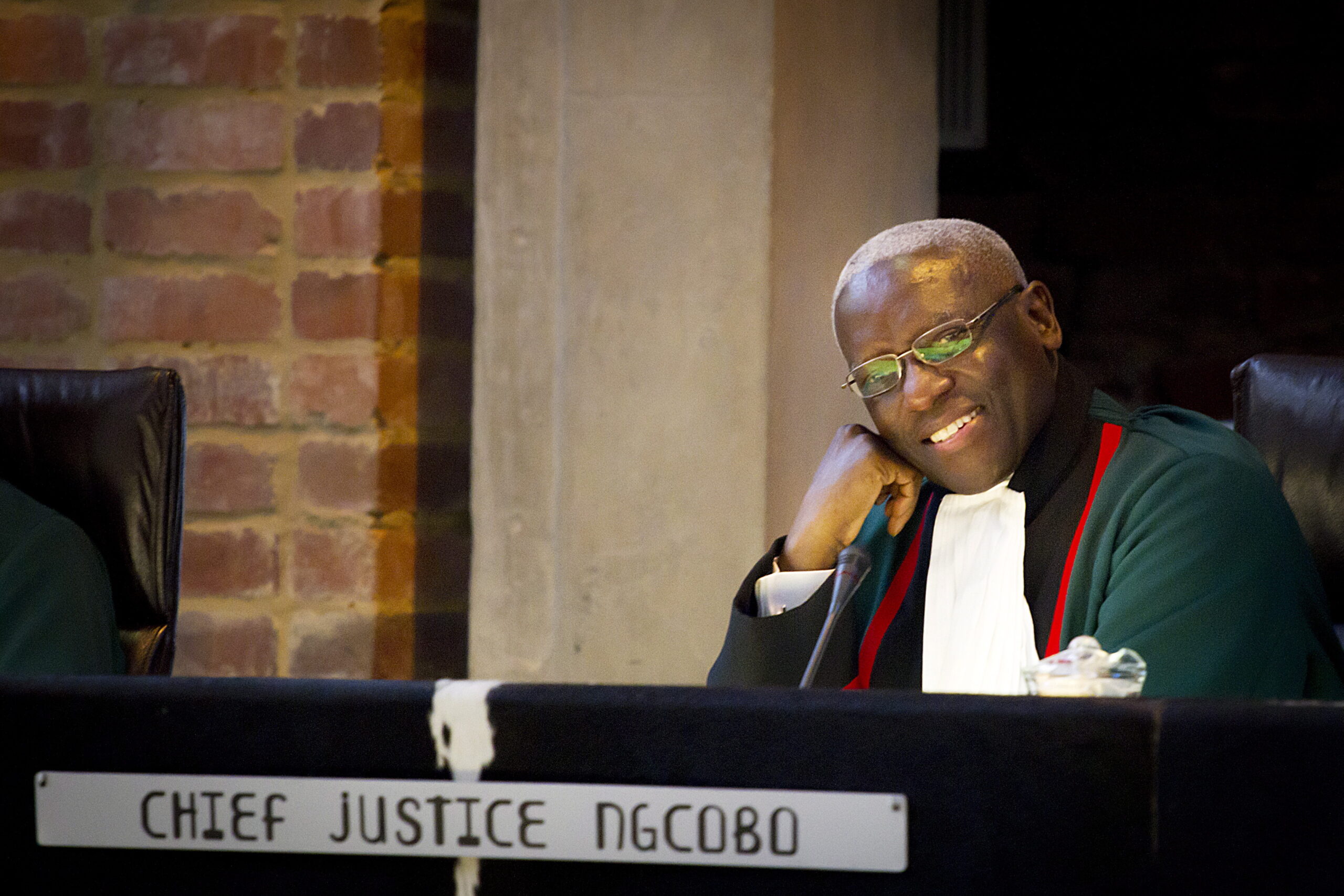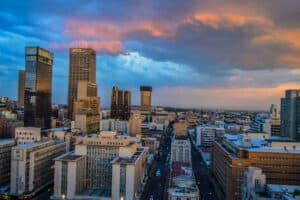The panel will decide whether the president will be subject to a process that may lead to his removal from office.

A parliamentary panel has been appointed to decide whether President Cyril Ramaphosa has a case to answer regarding the robbery at his Phala Phala farm.
After receiving 17 names from various parties, National Assembly Speaker Nosiviwe Mapisa-Nqakula on Wednesday announced the independent panel, which will be chaired by former Constitutional Court (ConCourt) chief justice, Sandile Ngcobo.
Former Gauteng Division High Court judge Thokozile Masipa and University of Cape Town (UCT) associate professor Richard Calland will also sit on the three-person panel.
The panel, to be given 30 days to complete its work, will decide whether the president will be subject to a process that may lead to his removal from office in terms of Section 89 of the Constitution and Rule 129A-Q of the National Assembly Rules.
But who are the people on the panel and do any of them have any history with the president?
Justice Ngcobo
Background
Born in Durban, KwaZulu-Natal (KZN), in 1953, Ngcobo was Chief Justice from 2009 until 2011.
He graduated from the University of Zululand in 1975, with a BProc (Bachelor of Law), earning distinctions in constitutional law, mercantile law and accounting.
From 1983 to 1985, Ngcobo studied for an LLB before attending Harvard Law School for a year, where he studied for an LLM (Masters of Law).
During his studies at Harvard, Ngcobo concentrated on constitutional law, labour law, international legal process and international human rights.
Career
After having practised as an advocate in Durban from December 1988 to November 1989, Ngcobo left for the United States (US) once again, working as an associate attorney (specialising in labour and immigration law) at a law firm in Philadelphia.
Following his return to South Africa in the early 90s, he lectured part-time while practising as an advocate before he served as a judge of the Supreme Court (Cape of Good Hope Provincial Division) in 1996.
He also had a stint as an acting judge of the Labour Appeal Court from January to December 1997.
Ngcobo was then appointed as the acting Judge President of the Labour Court and Labour Appeal Court in 1999.
That same year, former president Nelson Mandela appointed Ngcobo to the ConCourt before he succeeded Pius Langa as Chief Justice, where he served for two years until his retirement.
Judge Masipa
Background
Masipa, born in 1947, grew up in Soweto and later obtained a Bachelor of Arts Degree in social work in 1974.
She worked as journalist with stints at The Sowetan, among other publications, during the height of Apartheid before she began her legal studies and earned her degree in 1990, the year Mandela was released.
Career
Having qualified, Mapisa began practicing law after she was admitted as an advocate in 1991.
She was appointed as a judge at the High Court of South Africa (Transvaal Provincial Division) in 1998, becoming only the second black woman to the bench.
Masipa rose to prominence during the trial of paralympian Oscar Pistorius, who she found not guilty of the murder of his girlfriend, Reeva Steenkamp, and convicted him on a lesser count in 2014.
Her ruling, however, was overturned by the Supreme Court of Appeal (SCA) and Pistorius’ jail time increased from six to 15 years.
Professor Calland
Background
Born in the United Kingdom (UK) in 1964, Calland is a public law academic, columnist and author.
Calland obtained an undergraduate degree from the University of Durham.
He also holds an LLM from UCT as well as a postgraduate diploma in World Politics from the London School of Economics.
Career
After practising law for seven years at the London Bar (called in 1987 to Lincoln’s Inn), Calland moved to South Africa in 1994 to work as an advisor for the ANC in the Western Cape.
Since 2001, Calland has been a regular commentator in the media and his political columns have been carried in various publications, including The Citizen.
He is the author of Anatomy of South Africa and The Zuma Years, published in 2006 and 2013 respectively.
In 2016, Calland’s book on politics – Make or Break: How the next three years will shape South Africa’s next three decades – was published.
‘Objective panelist’
Speaking to The Citizen on Thursday, legal expert Dr Llewellyn Curlewis said he was of the view that the candidates were suitable to sit on the panel.
“There’s two former judges and a legal academic so as far as I am concerned, it’s a well-balanced panel, but as I have stated before, those three and anybody else on the nomination shortlist would have been a good choice. The big thing here is that the panel has individuals not associated with specific political parties,” he said.
The Democratic Alliance (DA), however, has expressed their discontent about Calland’s inclusion in the panel.
It said the Speaker of the [National Assembly], Mapisa-Nqakula, spectacular poor judgement on her appointment of [professor] Calland.
ALSO READ: DA reiterates call for ad hoc committee as Zizi Kodwa cleared in Phala Phala ‘cover-up’
“A legal expert, but hardly an objective panelist based on his public work. This move undermines the credibility of the [Section] 89 inquiry [which] throws the whole process,” DA chief whip Siviwe Gwarube said in a tweet on Thursday.
“The rules of Parliament are clear: The panel has to be independent and objective. The credibility of the process hinges on this requirement, otherwise it will be dogged by this appointment. We want to accept the outcome. Without concerns about the composition of the panel,” Gwarube continued.
In addition, DA leader John Steenhuisen said there was “by no stretch of the imagination” the columnist could be regarded as independent.
Majority rule
Commenting on the party’s reaction to Calland’s appointment, Curlewis said: “Even if that is so and I’m not saying it’s true, but obviously you will always have people that criticise from a specific political perspective.
“With that being said, remember the panel has three people, so a majority rule will advance their recommendations to Parliament. The minority judgment can also be delivered by a person deviating from the majority.”
The legal expert also agreed that Calland could be removed if any further complaints emerged.
“He can recuse himself as well. He can decide, after listening to the criticism against him, that he feels he would rather step aside.
“The Speaker would have to replace him with someone else. So that’s also possible, but for the same token, either Judge Masipa or Ngcobo can do the same,” Curlewis said.
“The mere fact that they made themselves available doesn’t mean they can’t change their mind in a week’s time or during the proceedings.
READ MORE: Malema denies bullying Public Protector’s office, but demands Phala Phala report
“If there is anything that’s indicative of some kind of prejudice at any stage, they can recuse themselves… There can even be a recusal application by the president’s legal team, so a lot of things can happen,” he added.
Meanwhile, political analyst Dr Ralph Mathekga seemingly shared the same sentiment, saying the legitimacy of any result depends on the credibility of the processes.
“I do not understand why should people already say we know this one will push for no impeachment or impeachment, we cannot predict the results based on an individual. They have people of integrity, the results will most likely be legitimate,” he told The Citizen.
Another political analyst and Research Director at North West University, André Duvenhage, said the panel can be considered “controversial”, but they should not be judged before they do their work.
“My assessment is that the controversy will continue. I think it is a bit immoral to make [a conclusion] on people before they did their work. So I think it is premature to make an assessment on that panel, but it’s already controversial as is the Phala Phala thing and I think the controversy will deepen as the process continue,” Duvenhage said.
Section 89
The establishment of the panel comes after Mapisa-Nqakula accepted a request by the African Transformation Movement (ATM) for a Section 89 inquiry to be established against Ramaphosa.
The ATM’s motion was based on allegations of money laundering, among others, related to the February 2020 theft at the president’s Phala Phala farm in Limpopo.
The panel has to make a recommendation whether sufficient evidence exists to show Ramaphosa committed any of the violations specified in the party’s motion.
READ MORE: Phala Phala: Ramaphosa to face another motion of no confidence
If the panel recommends to Parliament that Ramaphosa has a case to answer, their recommendation will be put to a vote in the National Assembly.
A Section 89 impeachment committee will then be established to inquire into the president’s fitness for office if a majority is achieved during the vote.
This could ultimately lead to Ramaphosa’s impeachment if that committee also recommends his removal.
A two-thirds majority will be required during the impeachment vote in the House.
Additional reporting by Lunga Mzangwe






